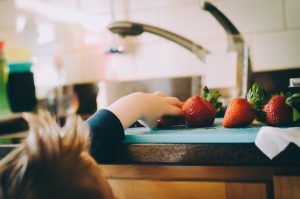 Children who spend time in the kitchen with their parents are learning more than how to cook. When kids help prepare the family meal, they become more invested, making them more likely to try new foods. Cooking allows for a practical application of measuring, following detailed instructions, and learning which foods go together.
Children who spend time in the kitchen with their parents are learning more than how to cook. When kids help prepare the family meal, they become more invested, making them more likely to try new foods. Cooking allows for a practical application of measuring, following detailed instructions, and learning which foods go together.
- Newborn to Age 2
Simple observation can be a great introduction to cooking. The best way to get your kids interested in making meals is to simply bring them into the kitchen with you. Giving them a chance to watch you as you put together a meal allows you to talk about each step that you take. Introducing your children to food at an early age, and giving them a chance to touch, smell, and taste the food, can increase future interest in the kitchen.
- Age 3 to 4
Around preschool, children are old enough to lend a hand in the kitchen. Start with simple tasks like fetching ingredients from the refrigerator or washing produce in the sink. After you measure ingredients, kids can help pour them into a bowl and stir. Adding dressing to a salad, brushing butter over pastry items, or squeezing the juice out of lemons and oranges are all great ways for kids to experience the basics of cooking.
- Age 5 to 6
Once your son or daughter enters kindergarten, he or she can really begin to experience the joy of cooking. Have them crack eggs, measure and cut butter with a plastic knife, or have them help with school lunches by making sandwiches. This is also the age where children can learn how to set and clear the table and help with dishes.
- Age 7-12
By age 7, children can understand cooking measurements and how to read and follow a recipe. Simple foods, like meatloaves, and more complicated foods, like cupcakes, can be made without much help. However, parental supervision is still necessary when working knives or using the oven.
For more tips and tricks on how you can get your children excited about cooking, check out our Orlando private school blog.

